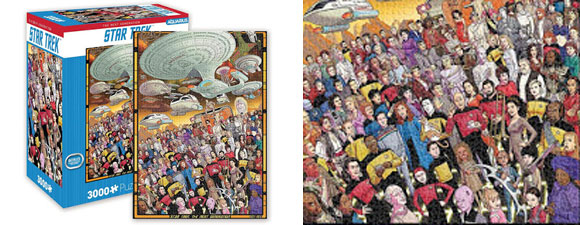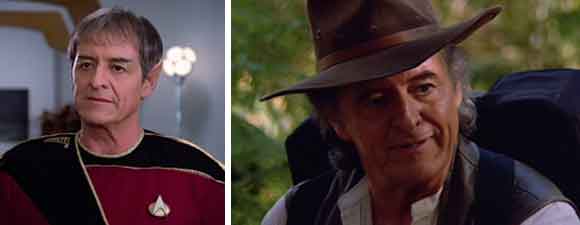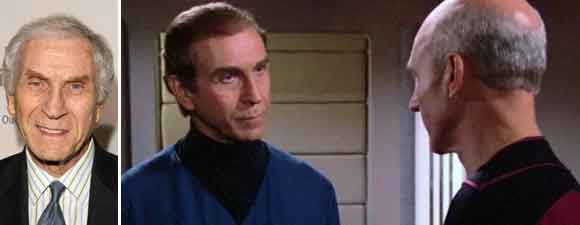Retro Review: Masks
6 min readAs an alien probe transforms the Enterprise, Data takes on the personalities of characters from the civilization that created it.
Plot Summary: The Enterprise encounters an ancient rogue comet that reflects back a sensor scan. Soon afterward, Troi finds a strange symbol-covered artifact in her quarters, and Data – who has been having trouble expressing himself in art class – sculpts a mask with unusual symbols. Not long afterward, similar symbols begin to appear on the ship’s viewscreens. LaForge tells Riker that apparently the ship downloaded an alien archive during the sensor scan of the comet. When the ship uses its phasers to melt the comet’s icy outer layers, they find an enormous ship contained within it, covered with more symbols. Data can interpret many of the symbols, particularly the large sun-like emblem, which he says is a mark of death. When LaForge examines Data’s positronic net, he finds that Data’s brain circuitry has been transformed – as has Data’s face, which now displays a compass symbol. A strangely light-hearted Data announces to Picard that a being named Masaka is waking and will bring death to them all. Then Troi enters and Data’s personality changes again, making him cower in fear. LaForge wonders if the alien archive has accessed Data’s circuits the same way it has accessed the ship, using Data to recreate alien personalities the way it is using the ship’s matter to create artifacts from its own culture. Ten Forward has turned into a jungle city, while the Observation Lounge has become a swamp. Picard believes he must act to destroy the archive before it destroys the Enterprise, but Engineering becomes transformed as well, leaving snakes in the torpedo controls. Data as Ihat tells Picard that he can only confront Masaka by building her temple, which Picard is able to do by using symbols revealed to him by Data’s other personalities, which LaForge inputs into the archive’s transformation program. Inside the temple, Picard and Troi realize that Masaka’s symbol is often accompanied by the smaller symbol for Korgano, whom Data says no longer pursues Masaka. Guessing that Korgano may be the moon to Masaka’s sun, Picard uses the transformation program to create Korgano’s mask and confronts Data, who is now wearing the mask of Masaka sculpted in art class. “Korgano” is able to convince “Masaka” to rest for the night and resume their endless pursuit in the morning, which shuts down the archive program, allowing the ship and Data to return to their conditions before the Enterprise scanned the comet.
Analysis: “Masks” shouldn’t seem as bad as it does. It routinely shows up on lists of Next Gen‘s worst episodes, which is unfair; there’s nothing in it that’s as offensive as “Code of Honor,” as embarrassing as “Up the Long Ladder,” as out-of-character as “Homeward,” or as bloody awful as “Sub Rosa.” And Brent Spiner gets to show quite a bit of range. Surely “Masks” is better than the original series comet surprise show “For the World Is Hollow and I Have Touched the Sky”! Both have unnecessarily convoluted plots and absurdly condescending attitudes toward the “primitive” cultures that built massive space archives, yet “Masks” is less sexist in its archetypes and more interesting in its visual portrayal of a world-ship. Even so, when Data falls on his knees to Troi and calls her Masaka, I can’t escape the feeling that I’m watching Star Trek’s answer to Rick Moranis asking Sigourney Weaver if she’s the Gatekeeper in Ghostbusters. I can’t point to a specific moment where the episode crosses the streams – maybe when Worf finds an Aztec mess exploding in Ten Forward, maybe when LaForge uncovers the bleeping snakes in the bleeping torpedo tube – but somehow, by the time Picard puts on his moon mask and enacts a love scene with Data’s falsetto sun goddess, it’s all turned to campy comedy, and not in a good way.
Despite Spiner trying, his performance is no rival to Patrick Stewart’s in “The Inner Light.” None of the alien personalities seems sufficiently thought out by the writers to make a really compelling character in its own right, and the most interesting, Ihat, is a bit too much like Lore the Trickster Android to stand out. Masaka’s fading, overwhelmed father might be more memorable if we were given some understanding of his archetypal significance – if she’s the sun, is he a primal force that created the universe, now all used up, or has he always been chilly and unfocused? Data reports that he can sense thousands of personalities living within him, yet we get little sense of a struggle for dominance, more like a kaleidoscope flipping pieces around. There are no obvious triggers that bring the trickster or the old man to the surface. We don’t get to stick with any one personality for long enough to absorb a deep fear of Masaka, though they all express it. (I keep wanting to type “moussaka,” which doesn’t help any when it comes to generating fear; I picture the crew threatened by a giant eggplant dish, and it’s not far from there to imagining them fighting Monty Python’s alien blancmange.) Since the episode starts with Troi suggesting that Data try to broaden his artistic perspective, I’m not sure what he’s supposed to learn by being taken over completely – that he should just enjoy the personality he’s been given? Or be glad he can be rewritten when he’s dull?
Then there’s the matter of the ship’s transformation. I’d have a much easier time believing in a mass crew hallucination than in what we’re told is happening – that the archive is rewriting all the matter on the Enterprise from inert objects to DNA – which has the effect of rendering weapons and transporters useless, yet somehow doesn’t affect life support, artificial gravity, the inertial dampers, or any of the other devices that keep the crew breathing and intact. We’re told that in a matter of hours, nothing on the ship will be recognizable, so even accepting that maybe the new plants are producing oxygen, it makes no sense that the ship continues to move with the comet and there are no devastating breaches. Okay, I did laugh when Worf said that part of Deck 12 was now an aqueduct, and if more of the story was played for laughs, it might have worked…Picard tries to keep an expression of wonder at the transformations being wrought upon his ship, but something more like Kirk’s expression upon finding tribbles in the grain storage would seem more appropriate after a while.
There’s probably more to say but I’m not sure overanalyzing this episode will either redeem it or make it sillier for anyone. I still disagree with fans who list it among the show’s ten worst; its biggest sin may be the ambition of its storytelling scope, and I rarely consider that a bad thing, even when the attempt fails. There aren’t any outrageous character cliches, and although the ancient civilization’s symbols seem based on human archetypes rather than intriguingly alien, it’s less embarrassing than the original series’ versions of natives in “The Paradise Syndrome” or “The Apple.” But compared to the storytelling of “Darmok” for instance, it falls far short.






